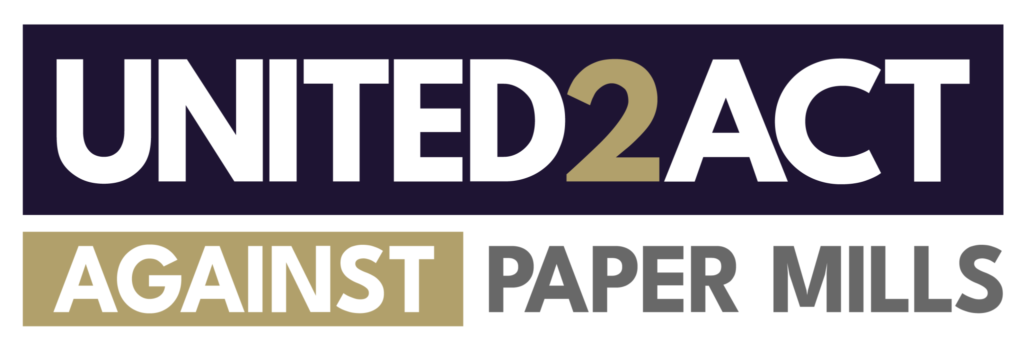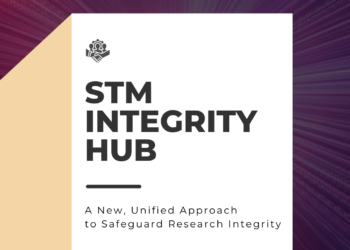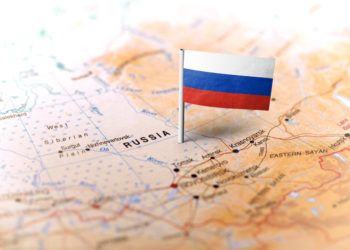Editor’s Note: Today’s piece is co-authored by Lisa Janicke Hinchliffe and Deborah Kahn. After many decades of working in scholarly publishing, Deborah Kahn now devotes herself to helping to address the challenges of research integrity and ethics in scholarly communications, primarily in her roles as Co-Chair of United2Act and as a Trustee of COPE.
The corruption of the scientific record is no longer an industry insider discussion. Research fraud has been the headline in major news outlets including The Guardian and The Financial Times. Identified causes are multiple: the pressure on researchers to publish, publishers failing to place sufficient emphasis on quality, and research institutions and governments wanting to rise in the rankings. This is a systemic problem and needs concerted and collaborative action from all the stakeholders involved to stem the tide and reverse the course.
In this essay, we present United2Act, an effort to combat the specific problem of paper mills, as a case example of the kind of joined-up effort needed. The effort is informed by earlier research, carried out jointly by STM and COPE, which explains that “paper mills are the process by which manufactured manuscripts are submitted to a journal for a fee on behalf of researchers with the purpose of providing an easy publication for them, or to offer authorship for sale.” Caroline Sutton, CEO of STM, framed the importance of United2Act’s approach in saying: “Though challenging, we can successfully address this situation together — but it will take all of us from across the scholarly community.”
In reality, many individual efforts are being made across the industry (e.g., emerging technological tools, education and training initiatives, and strategy development by research institutions, publishers, funders and governments) to address the problem of paper mills. But, these siloed efforts are limited in their scope. What is needed is to bring the parties together and to move things along faster.
This urgency brought together the international group that has formed United2Act, supported by STM and COPE. The effort began with a virtual summit in May 2023. Forty participants from 15 countries, representing research bodies, publishers, and universities, as well as researchers, sleuths, and representatives from ORCID, Clarivate, and Retraction Watch, identified five collaborative multi-stakeholder actions to address the problem of paper mills.
Consensus Statement
A Consensus Statement, outlining these five actions was published in January 2024. A multi-stakeholder working group has been established for each of the action areas.
The Consensus Statement was published with endorsement from the participants in the May 2023 Summit. Since then, a steady stream of additional organizations have joined as signatories and added their efforts to the working groups. Organizations endorsing the Consensus Statement include: the European Research Council, the Global Young Academy, the National Research and Innovation Agency of Indonesia (BRIN), Canadian Science Publishing, and the Asian Council of Scientific Editors, as well as a number of commercial and not-for-profit publishers, and other concerned organizations and individuals.
The breadth and depth of participation in United2Act’s efforts is reflected by Natalie Ridgeway, Executive Office of COPE, who shared her view that “United2Act has formed a formidable alliance of organizations and individuals to tackle paper mills head-on, demonstrating that only through collective action can we truly combat the types of fraudulent activities that undermine the integrity of the scholarly record.”
Working Groups
Initial objectives for each of the Working Groups have been agreed by the group members and the overall Steering Committee, which is chaired by Deborah Kahn, a COPE Trustee and Research Integrity Consultant, and Sabina Alam, Director of Publishing Ethics and Integrity, Taylor & Francis. A Project Manager, Ruth King, has been engaged by STM and COPE to support efforts to deliver on the goals of the Working Groups.
- Working Group 1: Education and Awareness will bring together existing resources, which can be used to train the trainers, including senior scholars and institutional leaders. These resources can serve as the foundation for shared educational programming as well as be customized to the needs of particular organizations or publishers.
- Working Group 2: Improve Post-Publication Corrections will start by focusing on drafting guidance to improve aspects of communication and speed of the correction of the literature. Though after-the-fact, these efforts are critical to minimizing the negative impact of actors who fraudulently manage to publish outputs of paper mills and corrupt the scientific record.
- Working Group 3: Research Paper Mills is focused on filling in the knowledge gap about paper mills and will start by creating a research manifesto/scoping review on paper mills, including a series of recommendations on what research is needed. It is hoped that this effort will encourage research to be carried out which will further reveal the extent of the problem of paper mills, how their practices are maturing, and possible actions to disrupt their impact.
- Working Group 4: Develop Trust Markers will start by looking at current efforts in this area by various organizations with the goals of suggesting possibilities for coordinating the work and harmonizing terminology. This effort informs proactive efforts to identify fraudulent manuscripts to prevent their publication and consider pathways for further enhancing these efforts.
- Working Group 5: Facilitate Dialogue is looking to enhance communications among stakeholders by fostering a shared understanding of the problem and vocabulary for representing it, the roles different stakeholders play in the ecosystem, and a map of the drivers for the different stakeholders. These outputs are anticipated to inform the work of all the working groups.
The Working Groups reflect what is so important about United2Act – it does not only oppose paper mills theoretically; it sets out an agenda to proactively address the problem. As Professor Jennifer Byrne, a medical researcher from the University of Sydney who has been flagging suspect papers for around a decade, explained: “Although many of us have been fighting paper mills on many fronts for some time, what’s been missing and what United2Act provides is coordination and dedicated resourcing towards tackling this worldwide problem. I’m very pleased to chair the Research Working group, where we will advocate for research to better understand the problem and to design real-world, effective solutions.”
The Steering Committee will provide ongoing support and monitoring of the Working Groups, keeping their activities in alignment. A report on the progress of these groups will be given in a keynote lecture at the June 2024 World Congress on Research Integrity in Athens. Anyone interested in joining the efforts of United2Act should contact contact@united2act.org.
Discussion
1 Thought on "United2Act Against Paper Mills: Fighting Fraud that Corrupts the Scholarly Record"
I am impressed by this initiative and can see that you (Lisa and Deborah) both of you I know and admire but I wonder whether you will be reaching the researchers who need to understand and act. I see the GYA are listed but I wondered about the International Council of Science? The predecessor International Council of Scientific Unions (ICSU) used to be receptive to such cooperation/collaboration. My experience as an information scientist with CIBER Research on their Harbingers programme (ongoing) has led me that early career researchers, at least in UK and USA, do not understand papermills. You have to explain them and then they are perceived as something Chinese. Actually their responses to questions about research integrity is much more complicated and if it is any help I could draw out these at least for UK and USA if that is of any use to the cause.




